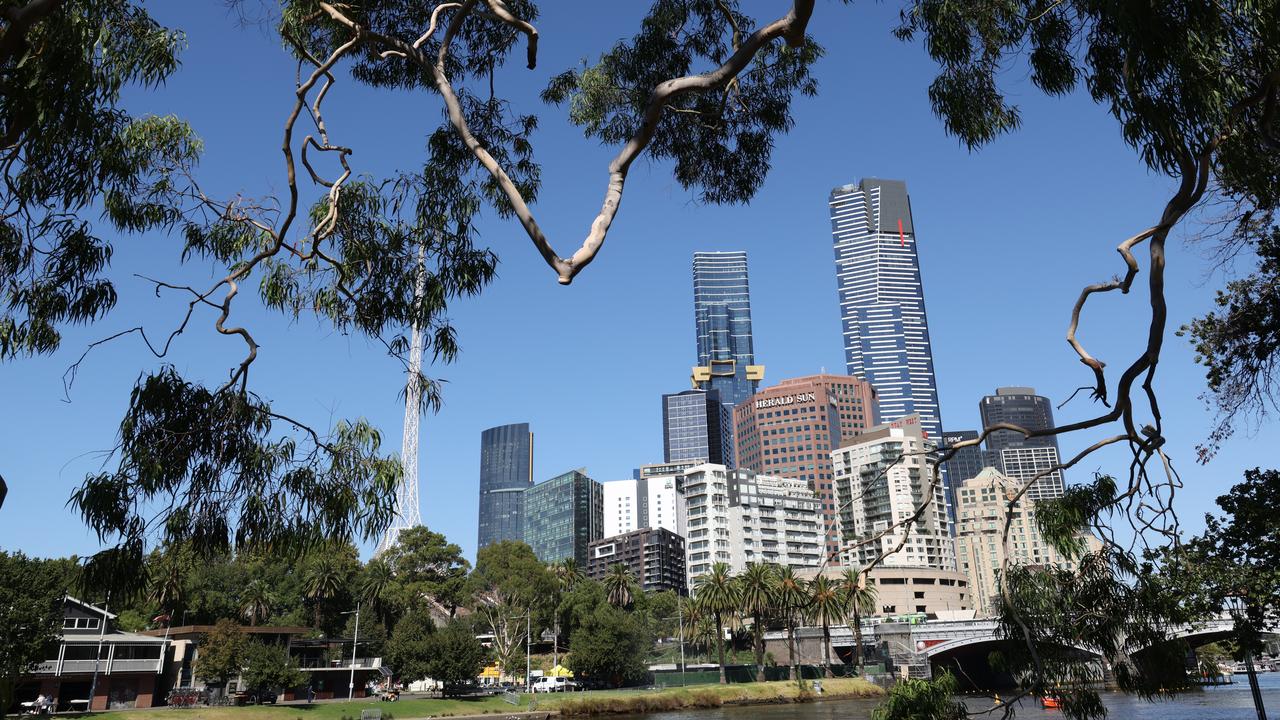Foodbank chief David McNamara has an appetite for helping
Food has dominated David McNamara’s life since he was a “kitchen hand” to his mum as a boy. Now chief of Foodbank, his mission is to connect people in need with those who can give.
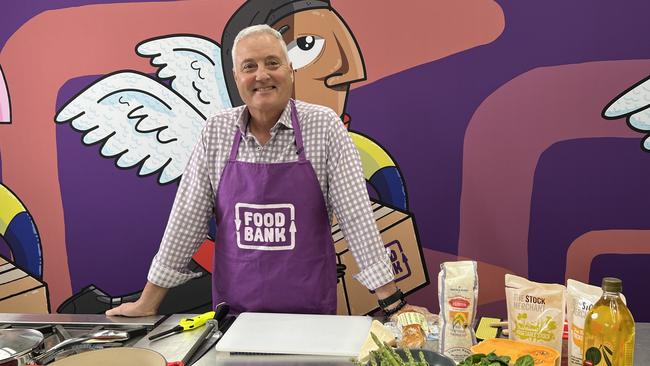
Victoria
Don't miss out on the headlines from Victoria. Followed categories will be added to My News.
David McNamara wants to drain the state’s “food swamps”.
The organisation he leads, Foodbank Victoria, has been mapping hunger hot spots since the pandemic, but has also identified another quagmire for many families.
“Part of the problem in some areas is that people have to get through the swamp of convenience junk food to get to their fresh food,” he said.
“So we ask, where can we put the fresh food to make it easier for them?”
The data-based approach to tackling hunger and disadvantage is transforming the social services landscape, with each of Victoria’s 79 local government areas ranked by need and targeted with mobile – and free – supermarkets, as well as extra assistance for charity partners.
Food has dominated McNamara’s life since he acted as his mum’s “kitchen hand” as a boy.
His mission today is simple: to connect people who need food with people that have food.
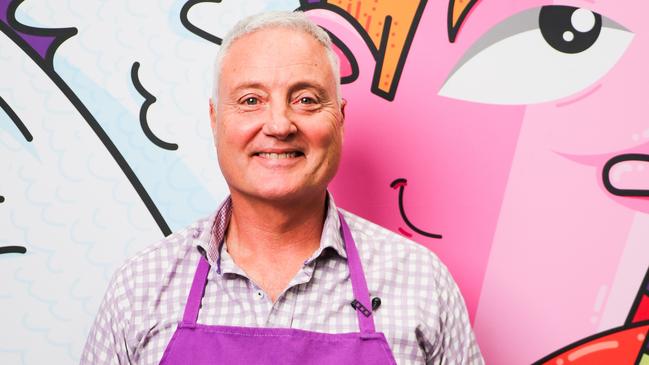
Bookies and heretics
When McNamara’s father, Kevin, was young he was a “cockatoo”.
Cockies would stand at the end of a laneway while a bookmaker – in this case McNamara’s grandfather – took illegal bets on horse races, ready to screech if they saw a police officer.
Showing an aptitude for numbers, which his eldest son David would later inherit, Kevin was soon promoted to a “penciller” who worked out odds for punters.
Kevin later tried his hand at being a legal bookie at a racetrack, but after a flurry of favourites came in on the day he carried the bag, he found a job in IT instead.
He met McNamara’s mother, Denise, at a church dance, and the couple travelled the world before settling in Strathmore and raising four boys.
When he was in grade 4, McNamara remembers the family moving to the country town of Kilmore, which is Gaelic for “big church”.
“I remember I just got there, and we’re sitting around with the priest talking, and I said something, and he called me a heretic,” McNamara said.
“I’ve gone home and said, ‘Hey Mum, what’s a heretic? Apparently, I am one’.”
Other memories conjure big rural paddocks and being free to “just go out and play”, while food was also central to his upbringing.
“Mum was always cooking and dad would entertain people from overseas; mum was doing French and Italian and I became her kitchen hand and learned how to cook from her,” he said.
“For me, it wasn’t just the food, it was the intimacy of those relationships in the kitchen, and just the joy that good food on our table creates.”
He jokes that the McNamara family was usually “the noisiest table in the restaurant” due to his father and brothers – Tony, Michael and Chris – being top-shelf raconteurs.
McNamara said he “hated school” but realised with hindsight the valuable lessons he was taught about “life, about grit, determination, community”.
“I came in at the end of corporal punishment, so my first day at school was being introduced to the cricket bat across the arse and it kind of went downhill from there,” he said.
“There were good bits to it, bad bits to it, but you know, it definitely helps define who you are. I try and flip stuff that’s negative and try and be grateful for stuff nowadays, especially as I get older.”
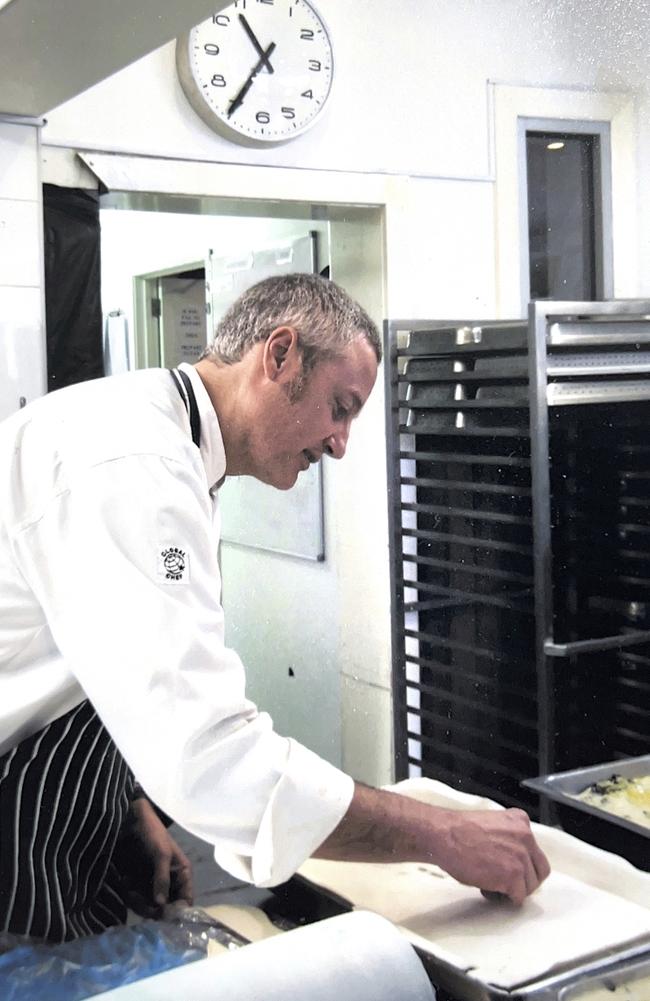
On a food mission
As a teenager, McNamara decided he wanted to emulate the legendary French chef Raymond Blanc, so searched for an apprenticeship.
He had an interview at Ford’s commercial kitchen, but never got a call back; his pitch about high French cuisine at a car company’s cafeteria might have been why.
Instead he finished year 12 and worked a job as a “lolly chef” at Allen’s confectionary in Broadford.
The jobs market was tough on the back of an early 1980s recession, and after stints as a poorly paid bank teller, a carpark attendant, and Pizza Hut manager – where he learnt about how to run a restaurant – he settled for a job in IT in Sydney.
“I was pretty good at it, but it certainly didn’t light my fire,” he said.
“I don’t think I was built for office cubicles.”
Returning to his passion for food, his parents helped him buy a cafe in Prahran that became a hit – until a local school and courthouses were shut by the Kennett government and his clientele dried up.
He adapted by establishing a catering company specialising in pies and cakes, but long hours and the risk of burnout saw him sell the business and approach the owners of his favourite local, Mario’s cafe, about a job at their Continental cafe in Prahran, where customers clamoured for dinner and a show.
He loved the job but it was a “young man’s game”, and unsuited to spending time with his soon-to-be wife Karen. So he spent seven years managing NY Bagels and other ventures before arriving at a “fork in the road” when a friend showed mental health problems.
“He lost everything and he was living out of his delivery van at St Kilda marina and was telling me about going to a place called Sacred Heart Mission for meals occasionally,” he said.
When McNamara picked up the newspaper and saw a job at Sacred Heart kitchen he couldn’t resist checking out the St Kilda institution.
“In my head I thought it was for the old bloke in the park, but it was everyone. It was old people, it was young people, streetworkers, pimps, it was drug addicts, it was people in suits, it was families; it blew me away,” he said.
McNamara took the job and found another chef “that thought the same way that I did” to recast the dining hall as a free French and Italian restaurant.
Within weeks he noticed “more laughter” in the dining hall. “It was great because people even started complaining about the food, because now they were building expectations,” he said.
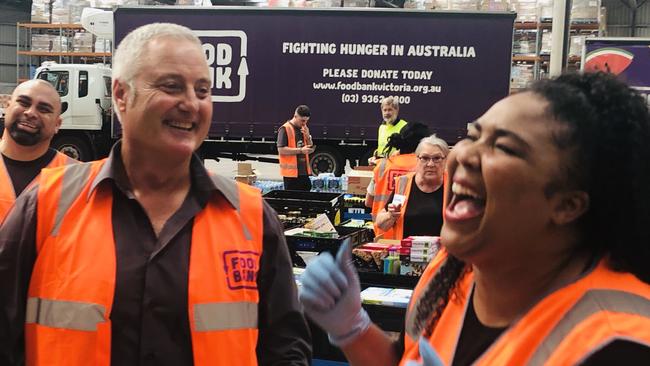
Taking it to the bank
McNamara later established a barista training program at Sacred Heart, and he developed connections with local cafes and restaurants to take in trainees.
He said people in the community were keen to help.
“I tell the story and let them ask how they can help,” he said.
When Philip Hunt, his predecessor as Foodbank Victoria chief executive, visited Sacred Heart he provided some frank views about the quality of the food available at Foodbank.
A few weeks later McNamara applied to be Foodbank’s operations manager and was met by Hunt on the interview panel – who gave him the job.
“The first thing I did when I moved here was set up the farms-to-family program, which is all about fresh food,” he said.
This increased fresh food provided each year from 50,000kg to 3 million kg.
McNamara said he was drawn to the basic premise of an organisation that tried to “connect the person that needs the food with the person that has the food”.
“There’s always reasons to judge people, but at our heart we are just people. Everyone has bad luck, everyone makes mistakes, some of us recover from them, some of us don’t,” he said.
“Some of us have had awful upbringings and don’t recover from that, and some of us do.”
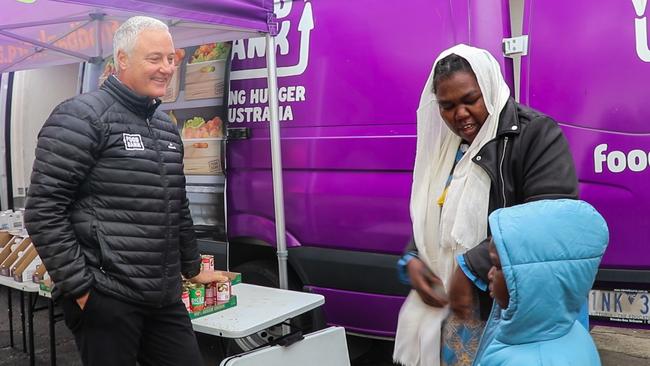
Fires and famine
As the Ash Wednesday disaster unfolded in February, 1983, the McNamara family car in Kilmore was packed and “ready to go” as bushfires bore down.
“The wind turned and that saved us, but it took the life of a grandfather and grandson who were escaping it,” he said.
“We had the fire brigade, the SES, the CFA all around, just that sense of community. You remember watching the community come back from that, and some of that survivor guilt, but also the community just coming together.”
Almost three decades later, McNamara had stepped up as Foodbank’s acting chief executive when Black Saturday struck.
That event forever changed Foodbank’s role during disasters, due to the creation of a state emergency management plan.
It also spawned what became known as Foodbank’s school breakfast program, which helped children going back to school while in temporary accommodation.
The program now provides healthy meals for students to start the day in more than 1000 schools through a partnership with the Andrews government, and has been credited with improving attendance and concentration, and reducing bullying.
Cooking classes for parents and children at their school are the latest offshoot of the program, teaching kitchen skills while broadening social networks.
“We get letters from parents thanking us because it’s improved their relationship with their kids. It’s what I always knew food could do,” he said.
Despite a history that stretches back to 1930 when it was the Victorian relief committee, McNamara said Foodbank had been a “quiet achiever”.
But when Black Summer bushfires raged in 2019, the organisation was front and centre during the emergency response and turned its Yarraville warehouse into a drive-through distribution point.
Almost 1500 vehicles came through in one day alone, to deliver shopping from car boots to distribution tables, and into to trucks.
“People could see the army trucks leaving and they felt right from that moment they were connected and helping,” he said.
“That, for me, was finally Foodbank showing the community who we are and what we do. It was the opportunity to let everyone know how they could be a part of it, and say that ‘I own Foodbank, and this is what Foodbank does’. The community were unbelievable.”
McNamara said those sorts of disasters brought focus on the organisation, but the “everyday disasters” families faced never stopped.
The two were intertwined like never before when Covid-19 arrived.
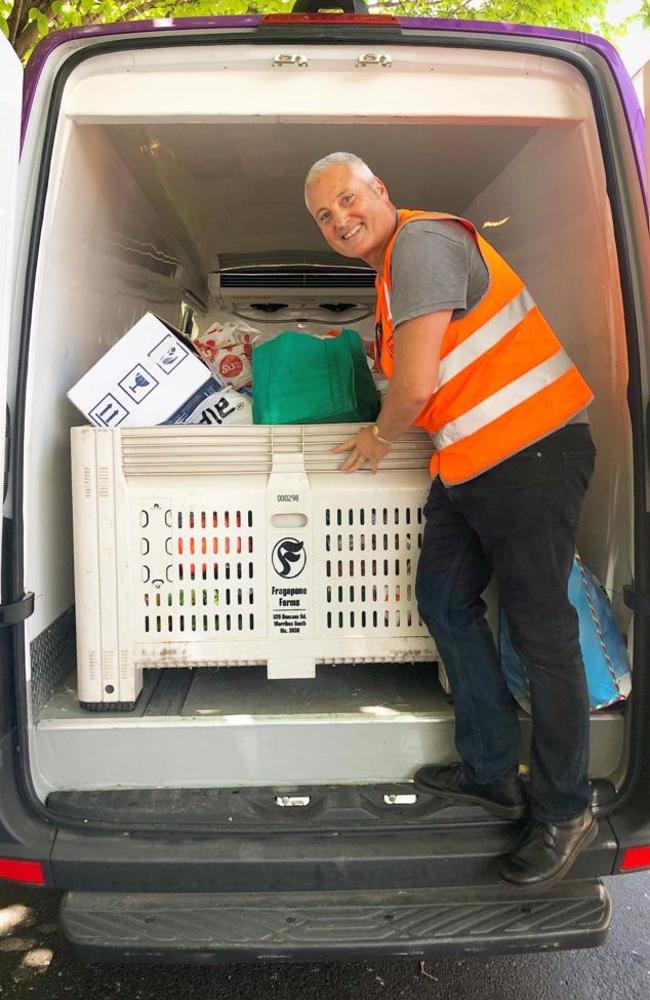
The crisis never ends
When Melbourne was repeatedly locked down during the pandemic, the challenges created were immense. When Jobseeker and JobKeeper were introduced, the types of people who accessed Foodbank shifted but demand never dropped.
Contactless drive-through supplies were introduced and famously blocked the West Gate Bridge due to a queue of cars trying to get to the Yarraville warehouse. A new partnership with Sky Bus opened when borders closed, with the transport company providing two coaches retrofitted as mobile supermarkets with fresh produce in fridges and on shelves. These still operate today.
“We can’t run enough buses,” McNamara said. “They’re bright, they’re colourful, they don’t cry charity, they cry community. Everyone’s welcome, and they’re free.”
The work to map food insecurity by each of Victoria’s 79 local government areas also began, while a web-based ordering system for partner agencies was created, similar to online supermarket shopping.
This has been useful during the latest cost-of-living crisis, which McNamara recently said had seen working families needing food relief.
Foodbank is now developing a new community food centre concept that will be rolled out in Ballarat and Morwell, with land for growing food, warehouses to teach logistics, and kitchens to learn culinary skills.
Like the school breakfast program, everyone will be welcome.
“Basically, it’s like (the film) Field of Dreams; if you build it, hopefully they’ll come.”
Q&A with David McNamara
First job and pay
There weren’t many opportunities in Kilmore for work, so I borrowed our mower and mowed the neighbours 5-acre front yard for $50.
If you weren’t doing this job, what would you be doing?
Can’t really imagine doing anything else, continue to help people understand the connection, joy and magic that food can bring to your life.
Five people you’d invite to a dinner party (dead or alive)
One last family dinner with my dad, mum, and us four boys sharing stories, our lives and laughter. They usually finished with either mum or the waiter asking us to keep it down because we were the noisiest table in the restaurant.
Book everyone should read
Jonathon Livingston Seagull, by Richard Bach – a great parable of self-discovery, self-belief and the limitless possibility of the mind and spirit.
If you could live anywhere in the world besides here, where would it be?
Anywhere that the ocean and the forest meet.
First concert, dream concert (dead or alive)
Before they were big, ACDC played at the Kilmore Hall as a support band for Dove.
Dream concert would have been to listen to the Beatles play their last concert from the roof of Apple building in Saville Row.
Most inspirational living person
Raymond Blanc inspired me to become a chef and still does.
What advice would you give your 18-year-old self?
Slow down, pay attention, be grateful.
First car, current car, dream car
1969 red Ford Cortina, 2013 Ford Territory. I used to be right into cars but not so much anymore. However, offer me a drive of a ’67 Mustang Shelby GT500 Eleanor and I would be a happy man.
One thing people didn’t know about you/hidden talent
I’m one of those people that swim in the bay all year round in a pair of board shorts.
Best and worst birthday present you’ve ever received
A professional knife set from Mum and Dad was the best. Not sure there’s ever a bad present, but the 15 year-old me remembers all the hankies and socks my Nana used to give me. Practical, but that not what you’re looking for at 15.
Rainy day TV binge
Of all time — The Wire or Sopranos. I did just finish “The Great” which my brother wrote and directed, which was …. Great – shameless plug!
Song you get pumped up to
The Pretender by The Foo Fighters.
Death row last meal
One that lasted many years and ended with a Chocolate Fondant.
Biggest career regret
No regrets, they’ve all led me to where I am now.
Best piece of advice you’ve received
From my dad. There’s no point worrying about anything as it probably won’t happen and if it does there’s no point worrying, because its happened and you just have to deal with it.
This year I’m most looking forward to …
Opening our new Community Food Centres in Ballarat and Morwell where we are hoping to build a community food system that is fair and sustainable for the planet and the community.
The one thing I’d love to change about Victoria/Victorians
The only thing I would change is that there would be no need for an organisation like Foodbank because everyone would have healthy food on their tables whenever they needed it.
The one thing I love the most about Victoria/Victorians
I love the way that Victorians more than any other community come together consistently to support each other through bushfires, floods, droughts, and pandemics. The way we care about each other and what we have as a community and as a state.


